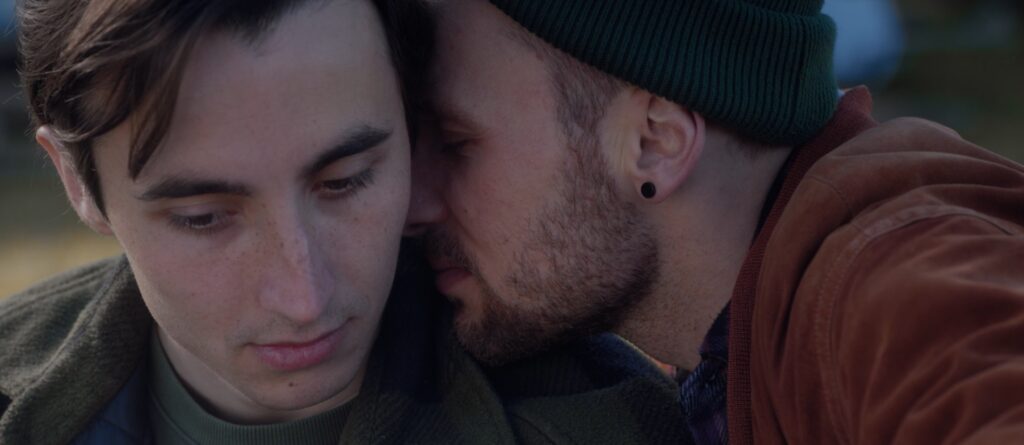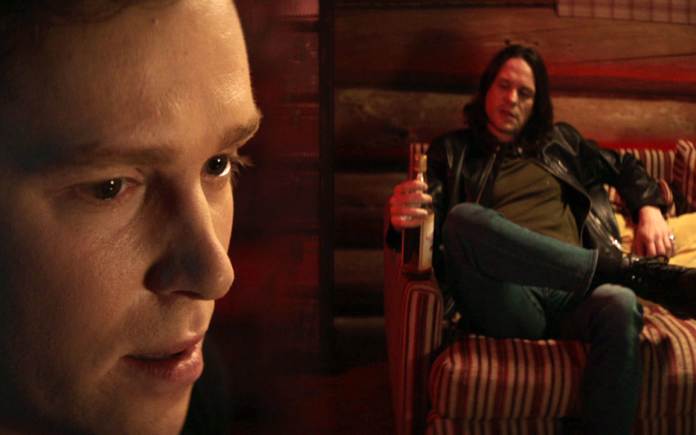Two gay imports about strangers interacting are now available for streaming. One is a British thriller, the other a Polish romantic drama. Both have their merits.
‘The Latent Image’: a decent enough genre flick
In “The Latent Image,” Ben (Joshua Tonks, who co-wrote the screenplay) is holed up alone in a cabin in the woods, working on a novel. On a dark and stormy night, (of course!) a mysterious drifter, known as “The Man” (Jay Clift) arrives saying his car broke down nearby. Is The Man really down on his luck, or is he planning to kill Ben?
Director/co-writer Alexander McGregor Birrell expanded this feature from his 2019 short of the same name (which also starred Tonks and Clift), and he relishes playing with the audience. Ben’s active imagination works overtime; after all, a potentially dangerous situation is, the film reveals, just a dream. But the arrival of The Man helps Ben with his writer’s block, and viewers will be intrigued as Ben wonders how did The Man’s hands get bloodied, and what is in his dead car’s trunk? And Ben goes all in for research, spying on The Man as he takes a shower, snooping through his bag, and even following and filming The Man as he tries to fix his car. Ben even has a pretty explicit sexual fantasy about The Man. Will these strangers become lovers? The film could have played that possibility up more.
“The Latent Image” keeps things deliberately ambiguous, which creates some of the tension, but also some frustration. When Ben’s fiancé, Jamie (William Tippery) is seen having a romantic moment with Ben in a fantasy sequence, it makes sense that Ben is longing for his partner. But when Jamie is seen picking up The Man in his car later in the film, it may or may not be real. Birrell overdoes the dream/fantasy sequences to the point where viewers may lose interest trying to parse out what actually happened, and this robs the film of its power.
One of the better episodes is an extended sequence featuring The Man and Ben puzzling out how to commit the perfect crime. They play out various scenarios with Ben tied up. The Man draws a knife, and then utters a homophobic comment. This has Ben rethinking his relationship with this sexy stranger. It is effective, even though Ben’s attitudes and actions after this pivotal moment are questionable, which is vexing.
Birrell manages to generate some suspense, especially in the early scenes, but as the tables turn — and Ben could be in serious danger — the film spins off in too many directions, getting a bit muddled until its “twist” ending.
“The Latent Image” isn’t perfect, but it is a decent enough genre flick.
‘Elephant’: a beautifully told and topical heartwarming drama of self-acceptance

“Elephant” is a terrific Polish romantic drama about Bartek (Jan Hrynkiewicz) who lives with his mother (Ewa Skibinska) on a farm. He loves his horse, Absurd, and wants a stud to improve his farm. He tends a bar at night, and cares for his neighbors, especially Danuta (Ewa Kolasinska).
When a customer in his bar dies, the man’s son, Dawid (Pawel Tomaszewski) returns home after years away. Bartek is quietly enamored with this handsome stranger, who escaped to the big city. As the young men spend time together, and get to know each other, an attraction develops. The way Bartek just looks at Dawid suggests an unspoken desire, and things culminate with a kiss and a passionate encounter.
“Elephant,” however, uses a TV announcement, as well as gossip from the community, to indicate the homophobia in Poland, and several of Bartek’s neighbors question if he is a “faggot” because of his intimacy with Dawid. Bartek tries to be discreet, and he gets support from Danuta, but tensions come to a head with graffiti and violence that threatens Bartek and his family.
In contrast, scenes of Bartek and Dawid going to a gay club and dancing are liberating. The drama builds; can – and will — this newly formed couple stay together? Dawid does not have the obligations Bartek does, but a family situation may keep Bartek tied to the farm.
Writer/director Kamil Krawczycki sensitively portrays Bartek’s life, without slipping into melodrama. Hrynkiewicz delivers a moving performance as a man who has long done things for others and is now getting a sense of what he wants for himself. A scene of him dancing while sweeping out a stable shows the positive effect Dawid has on him. Tomaszewski lends fine support as the stranger who inspires Bartek to act on his desires, and there are some lovely scenes of the young men in the countryside, riding horses.
“Elephant” is a heartwarming drama of self-acceptance that is topical, given the current attitudes towards the LGBTQ+ community in Poland, and beautifully told.
